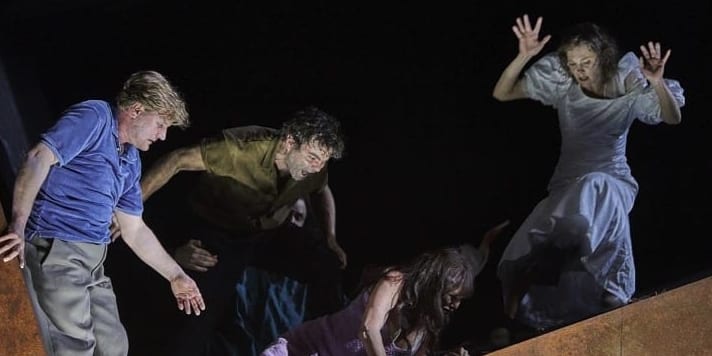Blanche’s arms reach up to her fingertips and try to connect to the new environment of her arrival. Having lost her inherited property in Belle Reve, she reconnects with her older sister Stella who lives in New Orleans. Stella is torn between her obligation to take care of the sensitive Blanche and fear of Blanche’s encounter with her manly husband Stanley Kowalski. Wrapped up in prejudices against one another, the relationship between Blanche and Kowalski is condemned to result in a precise and prefigured destruction.
Violence is as much a part of everyday life as a poker game or a few pints to end with. Those essentials eventually become a dangerous Kowalskian cocktail of assault. Not only does he hit his pregnant wife, but he also chases off his companions. Scared away by Stanley’s behaviour, Blanche assumes that Stella will not accept the current circumstances. But the limitations she sees in her lifestyle are in fact the standards Stella has learned to live by.
The play is an invitation to discover the wild side of the urban jungle. It is a typical Williams social drama that combines the opposing figures of a pathetically vulnerable figure seeking refuge in fantasy and a crude down-to-earth brutal reality. Cordelia Wege’s outstanding performance shows Blanche’s incomparable brokenness whether in the helpless innocence or ultimate defilement.
A play as uncomfortable as this, written in America’s late 1940s, cannot be displayed in the same paradigm nowadays. The manner in which different genders interact in this production suggests that there hasn’t been any change in the patriarchal household since then. And if so, do we have to accept Stella’s conclusion that ‘Desire’ is not a place she wants to escape from? After all, we’re in Brecht’s theatre with the Berliner Ensemble. Therefore, one must ask: ‘What do we learn that is new?’
Michael Thalheimer is known as an innovative director. But this staging, apart from the blinding neon lights and dazzling guitar chords, rather sticks to the contours of Williams’ original. This classic play is well illuminated by the performances of its actors. But other than that, it does not seek to problematise how obsolete societal constructions are transmitted.
If one does not feel the ultimate desire to leave this place, it is as though everything will be just as if Blanche never disembarked, which would, in turn, defeat the deeper purpose of the play.

